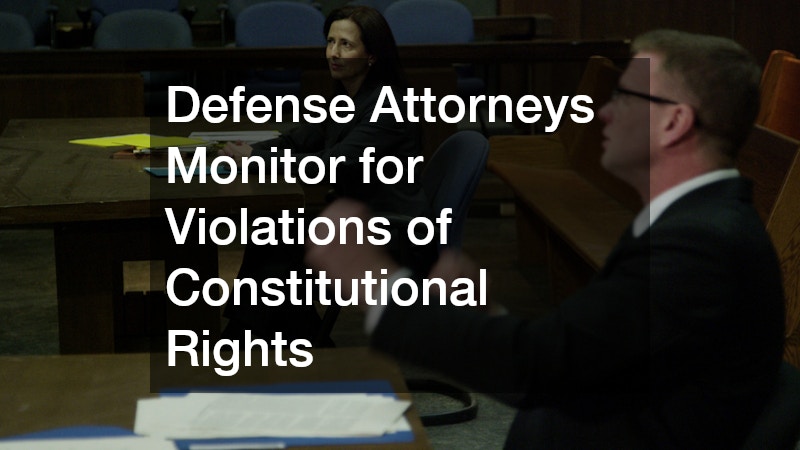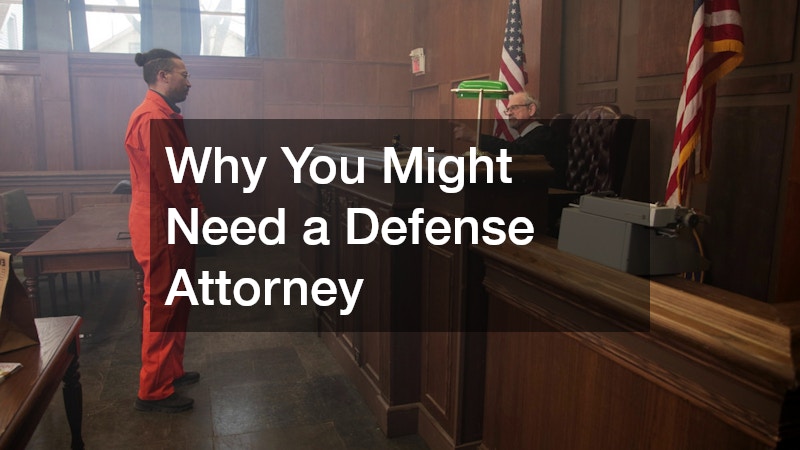Facing legal trouble can be a stressful and overwhelming experience, regardless of the circumstances. Whether it involves a minor dispute or a more serious allegation, having the right guidance can significantly affect outcomes. A defense attorney plays a crucial role in navigating the legal system’s complexities, offering expertise and support during difficult times. Understanding when and why you might need a defense attorney is essential to protecting your rights, maintaining peace of mind, and approaching your situation strategically.
Understanding the Role of a Defense Attorney
A defense attorney is a legal professional representing individuals accused of crimes, ensuring their clients receive a fair and just process. Their role encompasses advising clients, investigating cases, preparing legal documents, and representing them in court proceedings. By providing knowledgeable guidance, a defense attorney helps individuals navigate the legal system, clarify charges, and evaluate potential defenses. The presence of a skilled defense attorney can greatly influence how a case proceeds and the eventual outcome.
Specifically, defense attorneys assess the evidence, question witnesses, and develop strategies tailored to each case. They work to identify inconsistencies in the prosecution’s argument, negotiate settlements or plea deals, and prepare for trial when necessary. For instance, a defense attorney might negotiate reduced penalties or alternative resolutions in cases of minor offenses. Their work may involve extensive legal research, collaboration with experts, and courtroom advocacy to protect the client’s rights and secure the best possible result in more complex criminal matters.
Common Situations That Require Legal Defense
Many people underestimate the range of situations that may require a defense attorney. While serious criminal charges like theft, assault, or DUI immediately call for legal representation, other, less obvious circumstances can benefit from professional guidance. Situations such as misunderstandings with law enforcement, disputes over contracts, or allegations of fraud can quickly escalate without the proper legal support. Recognizing when to seek legal advice is critical in preventing minor incidents from becoming major legal problems.
For example, a traffic violation that seems minor at first could carry long-term consequences like increased insurance rates or a criminal record. Similarly, accusations of workplace misconduct may require legal intervention to protect employment rights and prevent unnecessary penalties. Defense attorneys can assess the specific circumstances, evaluate evidence, and advise clients on the best course of action. They can also intervene early to communicate with authorities, gather documentation, and build a case that safeguards the client’s interests.
Consequences of Not Hiring an Attorney
Choosing to face legal challenges without a defense attorney can lead to serious repercussions. Without proper representation, individuals may misinterpret legal procedures, overlook essential deadlines, or fail to present critical evidence. This lack of knowledge can result in harsher sentences, fines, or penalties that might have been avoided with professional guidance. The absence of an experienced advocate can leave individuals vulnerable to mistakes that could impact their personal and professional lives long-term.
Practically, this could mean pleading guilty to charges without fully understanding the consequences, missing opportunities to negotiate a more favorable outcome, or failing to challenge flawed evidence. For instance, someone facing a criminal trial without a defense attorney may struggle to cross-examine witnesses effectively or understand complex procedural rules. By contrast, having a skilled attorney ensures that all avenues for defense are explored, rights are fully protected, and legal strategies are executed effectively.
How a Defense Attorney Protects Your Rights
A defense attorney’s primary responsibility is to safeguard the legal rights of their clients. This includes ensuring that individuals are treated fairly, that evidence is collected legally, and that clients fully understand their options throughout the legal process. Defense attorneys act as advocates, using their knowledge and experience to prevent miscarriages of justice and to secure as favorable outcomes as possible. Their protection extends beyond court proceedings, influencing negotiations, settlements, and interactions with law enforcement.
Defense attorneys monitor for violations of constitutional rights, such as unlawful searches or coerced statements. They ensure clients are not pressured into decisions that could harm their case and provide counsel on responding appropriately during interrogations or court appearances. In complex cases involving multiple parties or overlapping legal issues, a defense attorney coordinates with other professionals to build a comprehensive defense strategy.
Choosing the Right Legal Representation
Selecting the right defense attorney is critical to achieving a positive outcome. It involves evaluating qualifications, experience, communication skills, and a track record of success. Every case is unique, and an attorney’s ability to understand the nuances of a particular legal situation can significantly impact results. Personal compatibility is also important, as a strong client-attorney relationship ensures open communication, trust, and effective collaboration.
In practice, choosing the right legal representation might involve consultations with multiple attorneys, reviewing past case outcomes, and assessing their familiarity with specific cases. Factors such as availability, fees, and approach to case management also play a role in decision-making. A well-chosen defense attorney will provide legal expertise and offer guidance tailored to the client’s needs, communicate clearly throughout the process, and advocate tirelessly on their behalf. This careful selection process can make the difference between a stressful legal experience and one that is strategically managed and effectively resolved.
Understanding the importance of a defense attorney is essential for anyone facing potential legal issues. From providing guidance and protecting rights to navigating the complexities of the legal system, these professionals serve as critical advocates in challenging situations. Their expertise ensures that individuals are not left to handle serious matters alone and that every possible defense strategy is explored. A defense attorney’s presence can help minimize risk, provide clarity during confusing proceedings, and ultimately secure the best possible outcome for clients.







